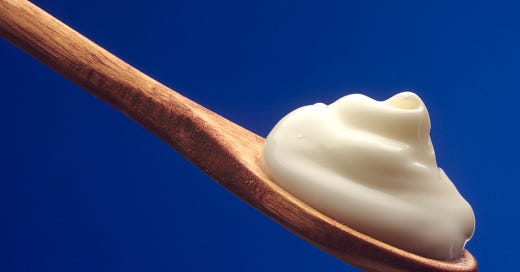This Week in the Mayonnaise Clinic: What Can Kamala Do?
Plus: should you still be masking for choral rehearsal?
Dear readers,
I did answer a piece of mail last Wednesday, but we didn’t call it a Mayonnaise Clinic. So let’s be clear today: Break out the spoons, it’s the Mayonnaise Clinic!
Let’s see what’s in the jar.
Edwin Ward asks:
If you woke up tomorrow in President Biden’s position (or slightly more realistically, Chief of Staff Ron Klain’s), how would you try to improve Kamala Harris’s standing? My sense is she has not been able to provide the level of productivity to the administration that Pence and Biden did for their administrations as VPs. In that vein: Should Biden try to switch running mates for the 2024 election? I say all this as someone who was a fan of Harris when she ran for president, watching her continually have issues since fall 2019 has not been fun.
What I find puzzling about Kamala Harris is that she used to have an image and a message, and she doesn’t anymore.
When she first ran for District Attorney in San Francisco in 2003, she won by running up the middle between a left-wing incumbent DA (Terence Hallinan) and a more traditional tough-on-crime prosecutor who had failed to beat him in two prior races (Bill Fazio). She espoused an ideology about crime that was tough and reformist at the same time — emphasizing the desirability of policing while also supporting reforms and developing alternatives to conviction and incarceration. She released a book in 2009, while she was DA, called Smart on Crime, in which she said things like “I can state categorically that economically poor people want and support law enforcement.”
There are all sorts of ways one can object to these ideas, from the right or the left, but my point is mostly that they are ideas. They reflect a coherent worldview, and one out of which Harris got a lot of mileage as she rose politically.
Then these positions fell out of fashion — not with the public, but with the sort of progressive activists that Harris seems to have viewed as her potential base for a presidential run. In 2019, she ran screaming from her past record as a prosecutor. But that change didn’t endear her to the left, who saw her as fake, and it left her without any real differentiating message for other segments of the Democratic primary electorate.
Harris announced her presidential campaign in January 2019, and The New York Times was already writing about how this dynamic had Harris floundering by May — which is to say, I disagree with Edwin’s claim that Harris’ issues first surfaced in fall 2019. Astead Herndon and Jonathan Martin wrote that spring:
Ms. Harris is under pressure from liberal activists who are pushing Democrats toward newer, bolder horizons. She has repeatedly sought to placate the left since setting her sights on the presidency — an impulse many in her orbit say is reinforced by her campaign chair, Maya Harris, her sister.
At the same time, other Harris advisers and allies have winced at some of the senator’s overtures to liberals, such as calling for eliminating private health insurance and refusing to rule out letting prisoners vote, two comments she later modified. These supporters believe her pool of attainable voters sits squarely between center and left, and that she need not always offer the answer liberal activists may want from her.
Her advisers disagreed about whether she should be left-wing or not. Well, where was the candidate in that discussion? The core problem with Harris seems to be that she doesn’t have one — which might be why she’s lately so partial to vacuous progressive blather about “equity.”
If she is willing to take it, my advice to Harris would be:
Keep reading with a 7-day free trial
Subscribe to Very Serious to keep reading this post and get 7 days of free access to the full post archives.




